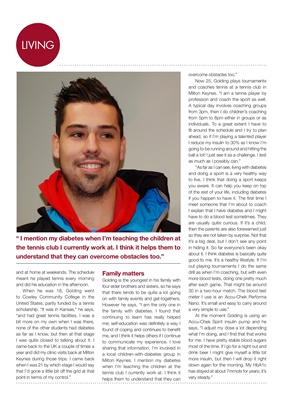
LIVINGLIVING
and at home at weekends. The schedule
meant he played tennis every morning
and did his education in the afternoon.
When he was 18, Golding went
to Cowley Community College in the
United States, partly funded by a tennis
scholarship. "It was in Kansas," he says,
"and had great tennis facilities. I was a
bit more on my own when I was there,
none of the other students had diabetes
as far as I know, but then at that stage
I was quite closed to talking about it. I
came back to the UK a couple of times a
year and did my clinic visits back at Milton
Keynes during those trips. I came back
when I was 21 by which stage I would say
that I'd gone a little bit off the grid at that
point in terms of my control."
Family matters
Golding is the youngest in his family with
four elder brothers and sisters, so he says
that there tends to be quite a lot going
on with family events and get-togethers.
However he says, "I am the only one in
the family with diabetes. I found that
continuing to learn has really helped
me; self-education was definitely a way I
found of coping and continues to benefit
me, and I think it helps others if I continue
to communicate my experience. I love
sharing that information. I'm involved in
a local children-with-diabetes group in
Milton Keynes. I mention my diabetes
when I'm teaching the children at the
tennis club I currently work at. I think it
helps them to understand that they can
overcome obstacles too."
Now 25, Golding plays tournaments
and coaches tennis at a tennis club in
Milton Keynes. "I am a tennis player by
profession and coach the sport as well.
A typical day involves coaching groups
from 3pm, then I do children's coaching
from 5pm to 8pm either in groups or as
individuals. To a great extent I have to
fit around the schedule and I try to plan
ahead, so if I'm playing a talented player
I reduce my insulin to 30% as I know I'm
going to be running around and hitting the
ball a lot! I just see it as a challenge. I test
as much as I possibly can."
"As far as I can see, living with diabetes
and doing a sport is a very healthy way
to live. I think that doing a sport keeps
you aware. It can help you keep on top
of the rest of your life, including diabetes
if you happen to have it. The first time I
meet someone that I'm about to coach
I explain that I have diabetes and I might
have to do a blood test sometimes. They
are usually quite curious. If it's a child,
then the parents are also forewarned just
so they are not taken by surprise. Not that
it's a big deal, but I don't see any point
in hiding it. So far everyone's been okay
about it. I think diabetes is basically quite
good to me. It's a healthy lifestyle. If I'm
out playing tournaments I do the same
drill as when I'm coaching, but with even
more blood tests, doing one pretty much
after each game. That might be around
30 in a two-hour match. The blood test
meter I use is an Accu-Chek Performa
Nano. It's small and easy to carry around
a very simple to use."
At the moment Golding is using an
Accu-Chek Spirit insulin pump and he
says, "I adjust my dose a lot depending
what I'm doing, and I find that that works
for me. I have pretty stable blood sugars
most of the time. If I go for a night out and
drink beer I might give myself a little bit
more insulin, but then I will drop it right
down again for the morning. My HbA1c
has stayed at about 7mmols for years; it's
very steady."
" I mention my diabetes when I'm teaching the children at
the tennis club I currently work at. I think it helps them to
understand that they can overcome obstacles too."